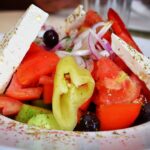They say that stories rise up out of the roots of an established idea. Well, since the Mediterranean diet has been around for thousands of years, it is bound to have a few tales here and there – including some misconceptions.
It was not so long ago that the Mediterranean diet has become the epitome of healthy food in the United States, as well as the rest of the world. Harvard School of Medicine and the World Health Organization researchers along with other experts created the Mediterranean diet Pyramid back in the 1990s and it has since been gaining popularity non-stop. The media, knowing that people nowadays are desperately seeking healthy alternatives to their traditional food sources, have been crazy in reporting about the Mediterranean diet ever since the New York Times presented a recent Spanish study showing that the diet may be better for the heart than a low fat diet.
Suddenly e-books that were rushly made appeared on Amazon and other bookstores overnight, buzz about the diet and recipes also started popping up on all the food websites and blogs. In fact, some sites and blogs were specifically created to talk about the Mediterranean diet exclusively! There have even been people who think of themselves as experts on the matter despite not living in the Mediterranean or have prior experience in eating or cooking meals from the Mediterranean diet.
Famous authors of hundreds of studies and reviews, Antonia Trichopoulou and Miguel Ángel Martínez-González, who are scientists and leading Mediterranean diet researchers from Spain and Greece, wrote an article about the misconceptions on the Mediterranean diet. Looking at online comments and even some articles published, the researchers felt compelled to clarify some of the myths and misconceptions on the diet. They fear that some misguided individuals might actually follow the misconceptions instead of what the REAL Mediterranean diet suggests you put in your meal plate. People might end up eating unhealthy foods and not get the benefits of this eating pattern.
The Myths and Misconceptions on the Mediterranean Diet
There is No Single Mediterranean Diet
This misconception grew from the idea that since there are dozens and dozens of recipes in the Mediterranean diet, therefore there is not a single diet to follow. But this isn’t true because there is, in fact, one Mediterranean diet model. From the original research into the diet, it was found that the people of Crete first created the Mediterranean eating pattern back in the 1960’s and that this diet pattern was similar with other diet patterns across Greece and Southern Italy. One factor that attracted researchers to that part of the world was the lesser rates of chronic disease in those areas – in fact; they were the lowest in the world at that time! What’s more intriguing is that Cretans and Southern Italians had the highest life expectancy too! However, the Mediterranean diet was not yet adopted by most countries in the region until at a later time when it gained notoriety via the US mainstream media. If anything, it should be called the “Cretan Diet” or “Southern Italian Eating Style,” but most of the components of the diet does indeed show up in the diets in other countries surrounding the Mediterranean Sea.
Olive Oil Should be Drizzled on Salads
You may find plenty of blog posts online advising you to drizzle a bit of olive oil on your salads or over cooked vegetables. Some are even debating on how much olive oil should be used in each serving – a Spanish study suggested 4 tablespoons, which some thought was too much. But actually, in the Cretan tradition of the Mediterranean diet their fat intake made 45% of the total calories of the diet! You’d be in for a shock if you ever saw how the Greeks use olive oil on their food. In fact, in Greek cuisine there is even a whole category of dishes named “lathera” which means “cooked in oil.” When it comes to cooking a lathero, it is required that the oil should be visible among the vegetables once they are cooked. Yet it is surprising to know that latheros have a modest caloric value despite the heavy use of olive oil, because the meal is composed of vegetables cooked in olive oil, with some bread and cheese. This is why these people very rarely gain weight. Living in an island means to live with limited resources – including food. This is why the people of Crete had to live off of the land and eat only what they produced like olive oil, vegetables and dairy. Vegetables and olive oil were used as a flavoring ingredient so that they could be satisfied with what they ate, because they don’t have that much money to buy meat on a regular basis. So it’s a bit confusing for me as to why these so-called “experts” think that only 1 teaspoon of olive oil should be drizzled to their food when, in fact, the Greeks and Italians use it in droves.
Nuts are a Big Part of the Diet
Once again the internet experts would have you believe that you should eat nuts daily, as it is a staple food in the Mediterranean diet. The truth is that they are not held in high esteem by the Cretans as most blog posts say they are. The Greeks only ate walnuts when they’re in season and not the whole year. While it’s true that the Greeks used nuts (mostly almonds and walnuts) for making sweet pastries and in some sauces such as skordalia (garlic sauce), it isn’t true that they consumed it daily. The only thing that is true about nuts in the Mediterranean diet is that they have a high nutritional value. In fact, even though Cretans ate nuts from their own almond trees they would only eat a small amount of it and saved the rest as they were considered precious and served only to guests. It is recommended though to consume nuts 2 – 3 times a week.
Plenty of Pasta
No. A plate of meal in the Mediterranean diet is not all just pasta, so don’t worry it will not make you fat. It’s actually a variety of grains such as barley rusks, whole wheat bread as well as potatoes, polenta, rice and of course pasta. To point out a fact, the traditional Greek diet actually contains 40% of carbohydrates and the other 60% is composed of vegetables and other minor ingredients. But one thing is for sure; they would often cook their pasta with olive oil or pair it with tomato sauce and not the usual American-style butter and cream based sauces.
The Mediterraneans Follow the Mediterranean Diet
According to the World Health Organization European countries are experiencing a rise in obesity among its population. Unfortunately many Mediterraneans do not follow their famous traditional diet any more. Their modern lifestyles are very dissimilar from their traditional Mediterranean lifestyle now. They consume more red meat now than their ancestors did 6 decades ago and they love munching on fast food meals and junk food too! Processed foods have become prominent in the average diet of the Modern Greek people, which is sad because they could have something better if they so choose – their traditional Greek food which happens to be one of the healthiest in the world.
The Traditional Mediterranean Diet is Not a Purely Vegetarian Diet
The Mediterranean diet is primarily, but not exclusively, a plant-based diet because it also allows you to eat meat in small amounts, as well as fermented dairy and fish and other seafood.
Pattern of Alcohol Consumption More Important
While the traditional Mediterranean diet encourages people to drink wine, it does so in moderation. Anything more than that is no longer beneficial for your health. Americans, however, consume alcohol more than what the Mediterranean diet recommends which isn’t healthy at all. The Mediterranean diet does not condone binge drinking and preference for beer instead of wine. Also the traditional Mediterranean diet has a 30% – 45% amount of fat in its meals and the “low fat” diet is not part of it. This concept is fairly new but we do not discourage it either as it has plenty of health benefits as well.
Avocado is Not Mediterranean
Avocado is a fruit that’s actually a native to South America, so saying that it is part of the Mediterranean diet is not accurate. However, since it does have some health benefits, I wouldn’t be against people including it as part of the ingredient of any meal prepared under this diet pattern.
Misclassified “Mediterranean” Foods
Other foods misclassified as part of a Mediterranean diet eating pattern include quinoa, margarine, and tofu.
The “Japo-Mediterranean” Diet is Not Mediterranean
You may have heard about the Japo-Mediterranean diet or “Japanese-Mediterranean diet” to be exact. While this diet pattern has the original ingredients of the traditional Med diet, it also contains some elements of famous Japanese foods such as soy, rice and seaweed. Olive oil, wine, fish, beans, nuts, seeds, vegetables, fruits, bread and dairy products are, of course, common in the Mediterranean diet.
A Proper Mediterranean Diet Requires the use of Olive Oil as the Main Source of Cooking Fat
This misconception is partly true, because cooking oils that have unsaturated fat such as flaxseed, peanut, corn, or sunflower oils, with similar or higher content in saturated fat than olive oil is explicitly prohibited to use in the Mediterranean diet. On the other hand, cooking oils from alternative sources such as sunflower, canola, soya, or other seeds can be considered, as they are rich in polyunsaturated lipids and are more ideal to use than lard or butter.
Other Myths of the Mediterranean Diet
Myth 1: The Mediterranean Diet Doesn’t Work Outside the Mediterranean
This myth came about due to the idea introduced that it’s not just a diet, but should be a lifestyle and you can’t (supposedly) have a Mediterranean lifestyle outside of the Mediterranean. But this notion is wrong and, in fact, the Mediterranean diet applies to anyone, anywhere. True you may not have the privilege of having a blue-green beach near your house, but that doesn’t mean you can’t live like Mediterranean people do with their simplistic and minimalist way of living. While there are many foods that are specific to the Mediterranean region, there are foods that could fit in a Mediterranean-style eating pattern near your area also.
Myth 2: The Mediterranean Diet is all About Pizza, Pasta and Cheese
Actually the Mediterranean diet encompasses the entirety of the food cultures of just about every country that borders the Mediterranean Sea, so no, it’s not at all about pizza, pasta and cheese. If anything, the Med diet is all about vegetables, fruits, beans and lintels dressed with olive oil. It’s an eating pattern so healthy that I’d like to believe that the Greek gods themselves gave it to the Greeks in the ancient past.
Myth 3: The Mediterranean Diet is too High in Fat
This myth is technically true; however, the types of fat that are common in the Mediterranean diet are good for the heart and does not, in any way, give people bad health or make them gain weight. As a matter of fact, there have been studies that had the test subjects followed the Mediterranean diet with high consumption of nuts or olive oil, and after many months the researchers found that they are healthier than those test subjects who were told to eat a regular healthy diet. They even encouraged the participants to take as much nuts and olive oil to feed their families – how awesome is that!
Most medical experts are convinced that the type of fat determines how people can benefit from them and not the amount they consume. Nuts and olive oil, as well as fish, contain heart-healthy polyunsaturated and monounsaturated fats. The traditional Mediterranean diet has very little saturated fat, meanwhile, the foods they eat that have saturated fat are cheese and yogurt and they consume them in moderate amounts also. With them being fermented foods, this adds another health benefit.
Myth 4: You Can’t Cook with Extra Virgin Olive Oil (EVOO)
This isn’t 100% accurate because while it may lose some of its unique flavor during cooking, it is still super healthy and experts recommend that you cook with olive oil, instead of other cooking oils. Although the EVOO has much lower “smoke point” compared to refined oils like canola oil, vegetable oils and light olive oil, it has its own advantages that it’s an ideal choice for cooking all types of home-made meals.
Note: the smoke point is the point when a type of oil starts to smoke and break down.
Most Mediterranean countries, especially Greece, use extra-virgin olive oil to cook just about almost anything. But depending on the quality, age and condition of the oil the smoke point is also determined. Good-quality EVOO is safe even at a temperature range between 350-410°F (177-210°C), and the reason behind this is because the oil is rich in antioxidants, which helps protect it from breaking down due to exposure to high temperatures. Poor quality oil, or oil that has gone rancid, will have a lower smoke point. If you want to know the quality of your EVOO, then simply do this test: swallow a spoonful of it. If you feel a burn at the back of your throat, then this is an indication that the oil is still in good condition and it still retains its polyphenols. Polyphenols are a family of phytonutrients that have powerful antioxidant properties.
Myth 5: The Mediterranean Diet is Hard to Follow
Actually, the Mediterranean diet is just as difficult or easy (depending on your perspective on the matter) to follow as any other nutritious and healthful eating pattern. But if you look at it in terms of balancing out certain foods in your diet (e.g. trying to increase or decrease your consumption of certain foods), and maybe cook at home more than you already do, then it will be a little bit hard to ease it into your life while you’re also busy handling other things. But don’t worry as it will only feel challenging during the first few weeks and you’ll adapt to it sooner or later.
Myth 6: All People Who Live in the Mediterranean are Healthy
Did you know that there are 21 countries along the coast of the Mediterranean Sea? They include Albania, Algeria, Bosnia and Herzegovina, Croatia, Cyprus, Egypt, France, Greece, Israel, Italy, Lebanon, Libya, Malta, Monaco, Montenegro, Morocco, Slovenia, Spain, Syria, Tunisia, and Turkey. But I hate to burst your bubble because not all of these countries practice the same healthy habits that we know about in the Mediterranean diet. For instance, the Italians in the northern parts of Italy actually cook their food in lard and butter, which is very unhealthy due to the high saturated fat their food contains. A very contrasting picture with what you see in Southern Italy.
The fact is that it was primarily the Cretans, Greeks, Spaniards, Morocans and Southern Italians that inspired the Mediterranean lifestyle that promotes better health. The rest of the Mediterranean countries just adapted this eating pattern after the research that was published on the matter over 70 years ago.
Myth 7: You Don’t Have to Go to the Gym
Technically this myth is based on the fact that Mediterraneans rarely did go to the gym – some not at all. However, this is still some sort of a misconception in the sense that even though Mediterraneans didn’t go to the gym often, they do live a fairly active lifestyle. If you follow the Mediterranean diet yet refuse to do enough physical activity, then you will not get most of the health benefits that it promises. So if you decide not to sign up for the gym near you, make sure that you engage in physical activities that will make you sweat. Trust me, a combination of delicious Mediterranean meals and physical activity will make you feel a whole lot better.
Myth 8: People from the Mediterranean Eat Huge Meals and Never Gain Weight
This is what a lot of people don’t get, and when I say “meals” I mean that Mediterraneans eat many small servings of low-calorie foods rather than large servings of high-calorie foods. When they do eat huge meals they do so with lots of vegetables – both raw and cooked – and small portions of meats, grains, and legumes. This enables them to maintain their weight despite their unusual food consumption. It’s not the size of the meal that matters most, but the ingredients in them. It’s the clear difference when you eat 1 pound of red meat versus 1 pound of vegetables and whole grains.
Myth 9: Food from the Mediterranean Diet Don’t Taste Good
This is so far from the truth and a biased opinion that’s probably hatched from someone who has eaten a lot of junk food. The herbs and spices alone used in the Mediterranean diet is more than enough to stimulate your tastebuds, in fact, the experience can be equated to riding a rocket to the moon and back! I mean, have you ever tasted adiveh, baharat, herbes de provence, sumac, or za’ atar spice in your meals before? These are the crème de la crème when it comes to world class culinary exposition. To say that food from the Mediterranean diet is not delicious is a crime at the very least. You’re missing out on a lot of things if you haven’t sampled them yet.
Why All This Matters
Because when you separate the myths from the facts, then you will have a better understanding of what the Mediterranean diet is all about and how to incorporate it into your life. Wrong information can have negative implications on the matter and some, can even become dangerous for people who rely on this information and harm themselves in the process. It was for this reason why I had to come up with this article in order to debunk all the misconceptions and myths surrounding the Mediterranean diet.








49 Responses
Good debunking of my misconceptions. Thanks!
Thanks for sharing this! Now I don’t have to be confused about the Med diet.
I was able to find good info from your articles.
This post is worth everyone’s attention. Where can I find
out more?
Way cool! Some extremely valid points! I appreciate you penning this article
and the rest of the website is also very good.
I every time emailed this blog post page to all my contacts, for the reason that if like to read it afterward my contacts will too.
Hi there mates, how is everything, and what you want to say
about this article, in my view its actually remarkable.
I just like the valuable information you provide in your
articles. I will bookmark your weblog and check again right here regularly.
I am relatively certain I will learn plenty of new stuff proper right here!
Best of luck for the next!
This is the perfect web site for anyone who hopes to find out about this topic.
You understand so much its almost tough to argue with you (not that I personally would want to HaHa).
You certainly put a brand new spin on a topic that’s been written about for many years.
Excellent stuff, just wonderful!
Wow that was strange. I just wrote an incredibly long comment but after I clicked submit my comment didn’t appear.
Grrrr… well I’m not writing all that over again. Regardless,
just wanted to say wonderful blog!
Excellent write-up. I definitely appreciate this website.
Thanks!
I think the admin of this site is really working hard in favor of his site, because here
every material is quality based data.
Thanks in favor of sharing such a pleasant idea, paragraph is pleasant, that’s why
i have read it completely
I’m extremely impressed with your writing skills as well as with
the layout on your blog. Is this a paid theme or did you customize it yourself?
Anyway keep up the excellent quality writing,
it’s rare to see a great blog like this one today.
It’s a paid theme but we did a little customization.
Thanks very nice blog!
Nice post. I was checking constantly this blog and I
am impressed! Very helpful information particularly the final section 🙂 I care for such info a lot.
I used to be seeking this particular information for a long time.
Thanks and best of luck.
I just like the valuable information you supply for your
articles. I will bookmark your blog and test once more right
here frequently. I am slightly sure I’ll learn many new stuff right here!
Best of luck for the following!
You actually make it seem so easy with your presentation but I find this matter to be actually something which I think I would never understand.
It seems too complex and extremely broad for me. I’m looking
forward for your next post, I will try to get the hang of it!
Terrific article! This is the kind of info that are meant to be shared across the web.
Disgrace on the seek engines for now not positioning this publish higher!
I got this web page from my buddy who told me about this web page and at the moment this time I
am browsing this web site and reading very informative
articles or reviews at this place.
Appreciating the commitment you put into your website
and detailed information you offer. It’s nice to come across a blog every once in a while that isn’t
the same old rehashed material. Great read! I’ve bookmarked your site and I’m adding
your RSS feeds to my Google account.
Nice post. I was checking continuously this blog and I’m impressed!
Extremely helpful info particularly the last part
🙂 I care for such info a lot. I was seeking this certain info for a very long time.
Thank you and good luck.
bookmarked!!, I like your website!
I am not sure where you are getting your information, but good topic.
I needs to spend some time learning much more or understanding
more. Thanks for excellent info I was looking for this info for my mission.
I don’t even know the way I ended up here, but I believed this
post was once good. I do not recognize who you are however certainly you’re going to
a well-known blogger for those who aren’t already. Cheers!
Keep on working, great job!
Thanks for one’s marvelous posting! I quite enjoyed reading it, you will
be a great author. I will be sure to bookmark your blog and definitely will come back very soon. I
want to encourage yourself to continue your great
work, have a nice holiday weekend!
Great post. I was checking constantly this blog and I’m impressed!
Extremely helpful info particularly the last part 🙂 I care for such information much.
I was looking for this particular information for a long time.
Thank you and good luck.
This is a topic which is near to my heart… Take care! Where are your contact details
though?
You can follow us on our social media pages and send us a DM there.
Thanks for finally writing about > Myths About the Mediterranean Diet < Loved it!
Excellent blog here! Also your web site loads up fast!
What host are you using? Can I get your affiliate link to your
host? I wish my site loaded up as quickly as yours
lol
Touche. Outstanding arguments. Keep up the amazing spirit.
Your style is unique in comparison to other people I have read stuff from.
Thanks for posting when you have the opportunity, Guess I’ll just book mark this
blog.
Hey I am so grateful I found your blog, I
really found you by mistake, while I was researching on Google for something else, Anyhow I am here now and would just like to say thanks a lot for a marvelous post and a all round enjoyable blog (I also love the theme/design), I don’t
have time to go through it all at the minute but I have book-marked it and also added your RSS feeds, so when I have time I
will be back to read more, Please do keep up the excellent work.
It’s enormous that you are getting ideas from this paragraph as
well as from our discussion made here.
When someone writes an post he/she maintains the thought of
a user in his/her brain that how a user can know it. Therefore that’s why this piece of writing is outstanding.
Thanks!
I enjoy reading through an article that can make people think.
Also, thanks for allowing me to comment!
I blog quite often and I truly thank you for your information. This
article has truly peaked my interest. I will book mark your blog and keep checking for new details
about once a week. I opted in for your Feed too.
Heya I’m here for the first time. I came across this board and I
find It truly helpful & it helped me out a lot.
I’m hoping to present something again and aid others such as you helped me.
This website really has all of the info I needed about this subject
and didn’t know who to ask.
It’s an amazing post for all the internet visitors; they will obtain advantage
from it I am sure.
You’ve made some really good points there. I checked on the web to
find out more about the issue and found most people will
go along with your views on this site.
Remarkable! Its actually amazing article, I have got much clear
idea on the topic of from this piece of writing.
Great work! This is the type of info that should be shared across the internet.
Shame on the search engines for not positioning this
post upper! Come on over and consult with my site .
Thanks =)
Aw, this was an incredibly nice post. Spending some time
and actual effort to create a great article but
what can I say? I procrastinate a lot and don’t manage to get anything done.
Hi there! I could have sworn I’ve been to this website before but after
going through a few of the articles I realized it’s new to me.
Nonetheless, I’m definitely delighted I found it and I’ll
be book-marking it and checking back often!
I hired a professional web developer to do it for me.